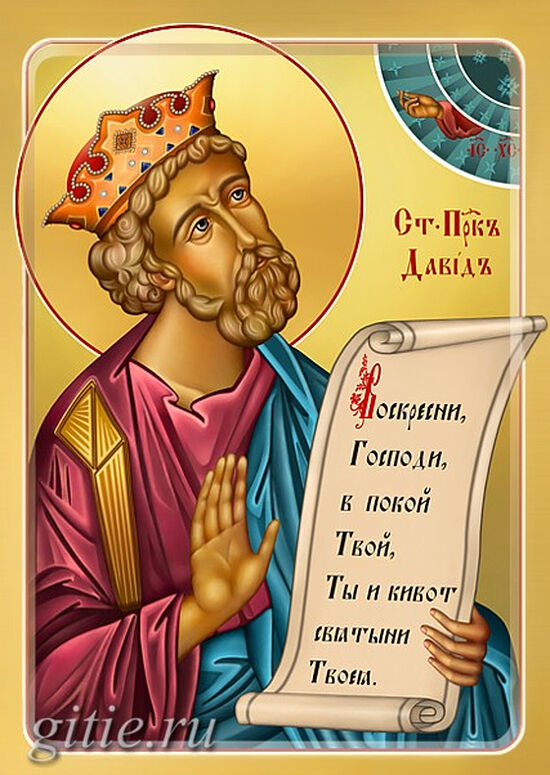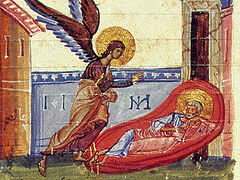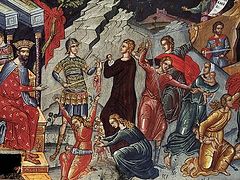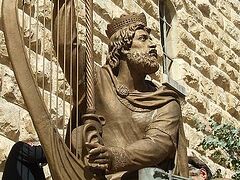The holy Prophet David was the youngest of the eight sons of Jesse, the elder of the city of Bethlehem, a descendant of Judah, to whom his father Jacob promised rule over the Israelites until the Coming of Christ the Savior.
Unaware of his future calling, David spent his childhood humbly, tending his father's sheep. Endowed with a glorious appearance, the young man was distinguished by extraordinary physical strength, courage, and dexterity. He could win in a fight with predators that stole sheep without weapons.
At that time King Saul still reigned over the Israelites, though he had already been warned by the Prophet Samuel: The Lord hath rent the kingdom of Israel from thee this day, and hath given it to a neighbour of thine, that is better than thou (1 Sam. 15:28).
The Lord loved young David for his meekness. At God’s command, Samuel took the horn of oil, and anointed him in the midst of his brethren: and the Spirit of the Lord came upon David from that day forward. So Samuel rose up, and went to Ramah. But the Spirit of the Lord departed from Saul, and an evil spirit from the Lord troubled him (1 Sam. 16:13, 14). The prophet Samuel went to the city of Ramah, and the future king David returned to his sheep.
St. David was obedient and meek. He did not like idleness: in his free time from work he played the psaltery, composing on it songs of praise to God. Over time, he achieved such mastery in music that he became famous even in the capital.
At that time King Saul suffered from bouts of severe melancholy and tormented everyone around him with his irritability. Saul’s servants invited St. David to the palace, so that by playing the harp he would soothe the king’s depression.
A war with the Philistines soon broke out. For forty days the giant Goliath, dressed in metal armor, challenged the best Israelite warriors to a duel, but no one dared to fight the giant. Goliath mocked the frightened Israelites. Outraged by the Philistine’s arrogance, St. David left his battle equipment, took a shepherd's staff, a sling, and a bag with five stones, and went out to the battle line. The young man replied to Goliath’s ridicule: “You come to me with a sword, a spear and a shield, but I come to you in the Name of the Lord of hosts, the God of the armies of Israel...” St. David’s faith in God’s help won him victory, which determined the outcome of the war. I went out to attack the Philistine, who cursed me by his idols. But after I uncovered his own sword, I cut off his head. So I removed the shame from the Israelites (Ps. 151:6–7).
So, King Saul made St. David the commander of all his troops. The Israeli women greeted them after the victory with songs and dances: Saul hath slain his thousands, and David his ten thousands (1 Sam. 18:7). Envy and hatred took full possession of King Saul. While listening to the music, he twice hurled a spear at St. David to pin him to the wall, but the saint escaped twice. To destroy the young man Saul sent St. David into the most dangerous battles against the Philistines, promising, in case of victory, to give him his eldest daughter Merab in marriage. After breaking his promise, the king was eventually forced to give him another daughter, Michal.
But the persecution did not stop. St. David’s wanderings began. He left his homeland. But when he came to Gath, where King Achish ruled, he was in great danger again because the king’s servants had recognized him. Pretending to be insane, David misled Achish and he drove him away.
St. David took refuge in the cave of Adullam, not far from Bethlehem, where he could feel safe from Saul's persecution. Filled with gratitude to God for his deliverance, he joyfully sang the praises of his Deliverer. And every one that was in distress, and every one that was in debt, and every one that was discontented, gathered themselves unto him; and he became a captain over them: and there were with him about four hundred men (1 Sam. 22:2). Twice St. David could have killed the king who was pursuing him, but he only took a spear and cut off a corner of his robe. He tried to convince Saul that in his heart there was no malice or deceit towards the Lord’s anointed. Deliver me from the workers of iniquity, and save me from bloody men (Ps. 58:2), the prophet cried out to God. Why art thou cast down, O my soul? and why art thou disquieted within me? hope thou in God: for I shall yet praise Him, Who is the health of my countenance, and my God (Ps. 41:12).
Meanwhile, another war between the Israelites and the Philistines broke out. The Philistines put the Israelites to flight and killed King Saul and his three sons. Having mourned over King Saul and those who had perished with him, David in obedience to Divine instructions went to the city of Hebron, where he was anointed king over the tribe of Judah. The other eleven tribes chose Saul’s son Ishbosheth as king. Seven years later, Ishbosheth’s army captains murdered the sleeping king, hoping to please David. However, it was their fatal blunder: St. David was indignant at their atrocity and ordered the traitors’ execution.
After Ishbosheth’s death, St. David was proclaimed king over all the twelve tribes of Israel. He was then thirty years old. Five years later, Jerusalem (“the city of peace”) became the capital of Israel. St. David brought the Ark of the Covenant there, established a solemn service in which singers and musicians participated, and wanted to build a magnificent Temple. But the Lord through the prophet Nathan announced to the saint that his son Solomon would do it, since St. David had spilled too much blood.
Blessed by God, holy King David prospered in all things. He successfully waged wars with his enemies. He dedicated everything he had taken from the conquered peoples to God, preparing material for the construction of the Temple. He did not boast of his prosperity, did what was just and right for his people, and his love for them never grew cold.
However, King David did not always remain calm, live piously, and take all external advantages. Sin entered his soul.
Once the king, carried away by the beauty of a woman named Bathsheba, the wife of Uriah the Hittite, who was then fighting in the war between the Israelites and the Ammonites, ordered her husband to be sent into the most dangerous battle. Uriah died, and King David married Bathsheba.
To denounce the king God sent the prophet Nathan. With deep sorrow the repentant king cried out: Have mercy upon me, O God, according to Thy lovingkindness (Ps. 50:1). The Lord forgave the penitent ruler, but retribution for his sin came soon.
First, the newborn son of King David and Bathsheba died. Another son of the king, Absalom, killed his brother Amnon, after which he had to leave Jerusalem and go into hiding. On his return to Jerusalem, Absalom rebelled against his own father. The king had to flee with the servants who remained loyal to him and hide from his son.
The holy king David accepted all sorrows and trials with humility as atonement for his sins. After the rebellion had been put down and Absalom died, the people of Israel returned David to reign over the kingdom. Then the persecution of David by his enemies ceased, but he was not spared calamities for the rest of his life. For three years in a row there was a famine in the land of Israel, then another war with the Philistines began. After the successful end of the war, a pestilence (plague) broke out in the country, killing up to 70,000 people. During this disaster King David again expressed his love for the Israelites and showed deep humility, imploring God: Lo, I have sinned, and I have done wickedly: but these sheep, what have they done? Let Thine hand, I pray Thee, be against me, and against my father’s house (2 Sam. 24:17). So the Lord was intreated for the land, and the plague was stayed from Israel (2 Sam. 24:25).
Before his death, being decrepit and weak, the holy King David gave orders to proclaim and anoint his and Bathsheba’s son Solomon his successor. Having handed to Solomon the materials prepared for the construction of the Temple and its design, he entrusted those close to him with help in its construction. Then, on calling God’s blessing upon the Jewish people and giving thanks to the Lord for all His blessings, the holy King and Prophet David peacefully fell asleep in the Lord in about 970 B.C. after reigning for forty years. He was buried in Jerusalem.
The holy Prophet and Psalmist David was constantly in prayerful communion with the Creator. A king and military commander, burdened with governing the state, he offered up his prayers even at night. By the grace of the Holy Spirit the holy Prophet David compiled the Psalter, which St. Basil the Great called the hospital for souls. Blessed Augustine writes that “the singing of psalms adorns the soul, calls on the Angels for help, drives away the demons, wipes out darkness, creates holiness, strengthens the mind of a sinful person, is atonement for sins, and is like alms to saints.” It was a custom in ancient monasteries to learn the entire Psalter by heart. Psalms are widely used in church services and private prayers.
The holy King David is revealed to be a prophet in the third part of the Psalter, which contains detailed prophecies of the coming to earth and the entire earthly life of the Lord Jesus Christ our Savior, His Passion, Resurrection from the dead, Ascension, and of the Blessed Virgin Mary—the Mother of God.





